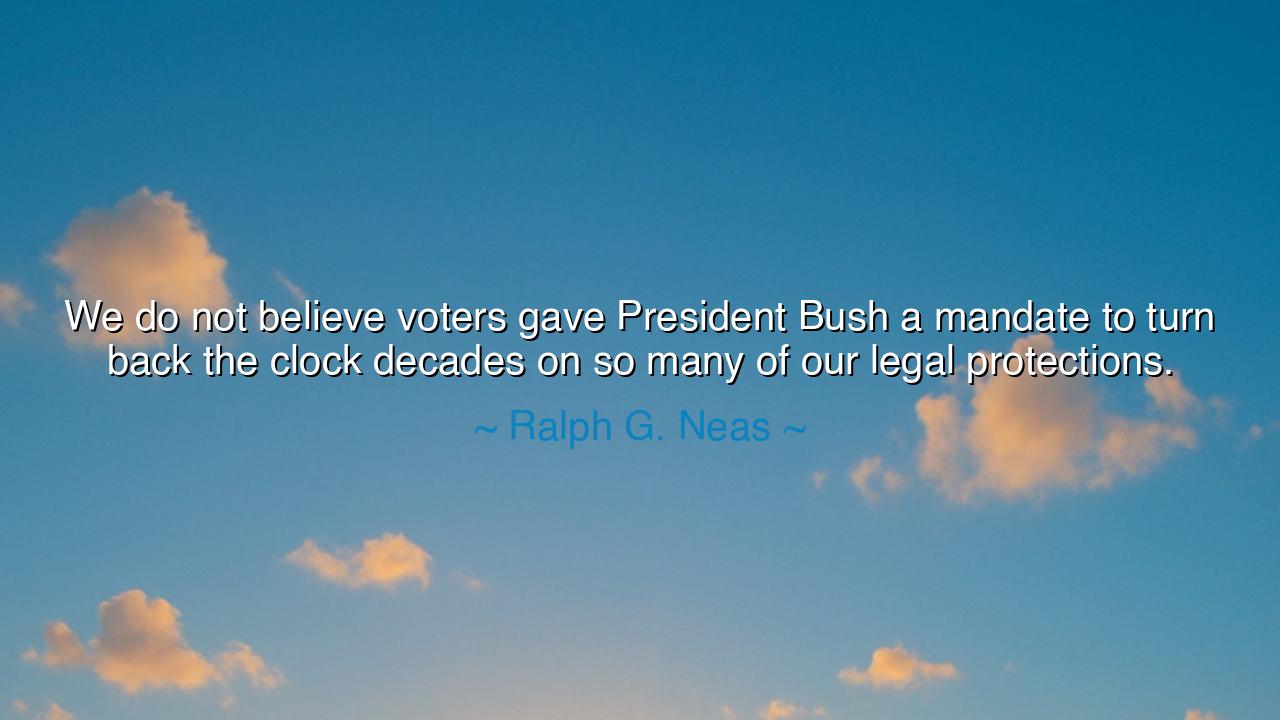
We do not believe voters gave President Bush a mandate to turn
We do not believe voters gave President Bush a mandate to turn back the clock decades on so many of our legal protections.






When Ralph G. Neas declared, “We do not believe voters gave President Bush a mandate to turn back the clock decades on so many of our legal protections,” he spoke not merely as a political voice, but as a guardian of justice — a sentinel standing before the gates of progress, warning against their being forced shut. His words are both an accusation and a call to remembrance. They summon the listener to reflect upon the long and painful journey that brought humanity from oppression into freedom, from silence into voice, from vulnerability into legal protection. To “turn back the clock,” as Neas warned, is not merely to change policy — it is to unravel the fabric of sacrifice that countless souls have woven across generations.
The origin of this statement lies in the turbulent years of early twenty-first-century America, a time when the nation stood divided over the meaning of its own principles. As President George W. Bush prepared to shape the Supreme Court and influence the law of the land, many feared that hard-won victories in civil rights, women’s rights, and workers’ protections might be undone in the name of ideology. Neas, a champion of equality and the leader of the People for the American Way, stood as a voice of conscience amid that political storm. His words were not only about law; they were about moral continuity, about the duty of every generation to protect the gains of the past from the erosion of complacency and power.
To “turn back the clock decades,” as he said, is to forget the struggles that carved justice from the rock of injustice. It is to ignore the marches of Selma, the courage of Rosa Parks, the labor strikes that demanded fair wages, the trials of women who fought for the right to vote and to govern their own bodies. Each of these battles was won not by decree, but by blood, sacrifice, and the unyielding will of ordinary people who believed that legal protections were not privileges to be granted by rulers, but rights to be earned and defended by all. Neas’s warning carried the weight of history — that the law, once made just, must be guarded, lest it be corrupted again.
In the ancient world, the philosopher Solon of Athens faced a similar test. When factions within the city sought to reclaim their power over the poor, Solon rewrote the laws to bring balance and fairness. Yet when he left Athens, he warned his people: “You may not change these laws in anger or in greed.” But they did — and the city fell into tyranny. Neas’s message is an echo of that ancient wisdom: that the law is not a tool to serve the strong, but a shield to protect the weak. Once that shield is compromised, civilization begins its descent into darkness.
His statement also reveals a profound understanding of the nature of democracy. Elections, he reminds us, are not blank checks for power; they are trusts bestowed upon leaders to advance justice, not dismantle it. The will of the people cannot be claimed as a weapon against their own welfare. A true mandate is born not from victory alone, but from service to conscience. When Neas said, “We do not believe voters gave President Bush a mandate,” he was affirming that leadership, in its noblest form, must protect progress — not prey upon it.
The emotional pulse of Neas’s words is one of guardianship — the ancient duty of remembrance. Just as a temple’s flame must be kept alive through the night, so too must a nation’s legal protections be tended through the passing of generations. For the enemies of progress are patient. They wait for weariness, for forgetfulness, for fear to dim the light of vigilance. But those who remember the cost of freedom — the mothers who buried sons for the right to vote, the workers who endured prisons for fair labor — will not allow the clock to turn backward.
Let the reader understand, then, that Neas’s message is not bound to his own time. It is a timeless commandment: Never let the victories of justice be undone by the complacency of peace. Laws, once made humane, must be guarded with eternal vigilance; leaders, once elected, must be held to account by the conscience of the people.
So let us carry this wisdom forward: when power seeks to rewrite the gains of history, we must rise — not in anger alone, but in remembrance. For the cost of progress is eternal defense. And the measure of a people is not how fiercely they fight for change, but how faithfully they preserve the protections their ancestors died to give them.






AAdministratorAdministrator
Welcome, honored guests. Please leave a comment, we will respond soon